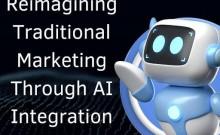
Artificial intelligence and machine learning (AI/ML) are increasingly permeating every facet of digital lives, especially those of engineers. Riding this change is Rahul Rai, an infrastructure product manager with a long history at renowned companies like Amazon, Microsoft, and Meta.
"It's a bit of a symbiotic relationship. AI and machine learning help develop new products but are also products to be developed. My work involves creating the lower-level infrastructure that engineers build AI and ML networks upon," Rai explains.
IPNext: A Case Study in AI and Machine Learning
Among Rail's more significant achievements is the development of the underlying infrastructure of IPnext. It is a large-scale inference engine designed to aid Meta engineers that build recommendation systems, particularly those who handle machine learning models for social media algorithms.
Rai's work on machine learning algorithms and the latest AI technologies allows these engineers to deploy specific models from publishing to serving at the customer's end.
IPnext simplifies complex machine learning models, especially for social media, making it easier for engineers to implement them. It changes how AI/ML is used, making it more straightforward and effective for engineers and those using Meta's products.
IPnext is just one example of artificial intelligence and machine learning being used to create new technological developments. As more organizations adopt these neural networks for various tasks, individuals like Rai will be responsible for even larger-scale products.
AI/ML Changing Product Development
Adding AI/ML to product development has become a game-changer in the always-evolving technology world. A recent Statista report says the global AI market will reach $1.9 trillion by 2030, up from $200 billion in 2023.
Rai, with his lengthy experience at companies like Amazon, Microsoft, and Meta, aids millions through his development of the underlying infrastructure behind AI/ML tools. His expertise is in building products for two different customer groups: the company's engineers who develop applications for consumers and the end-users who use those applications.
"It's a delicate balance. My work covers multiple domains. Without AI-assisted tools, my focus would be stretched far too thin," explains Rai.
Rai's current focus at Meta is on developing the tools to plan and operate the company's private cloud infrastructure. This requires expertise in many areas, including product management, large-scale program management, engineering, user experience design, research, and cloud financial operations (FinOps). Fortunately, his recent product the Infra Cloud Service Platform (ICSP) has primed Rai to work with large-scale cloud platforms, especially those within the Meta ecosystem.
"The tools we're developing play a crucial role in decision-making across platforms like Instagram, Facebook, and Threads," Rai says. "It's a complex system that requires a deep understanding of both the technical details and the user experience—all working together to build a better product for our customers. "
A McKinsey & Company report suggests that generative AI could increase yearly labor productivity from 0.1% to 0.6% through 2040. This shows the potential of AI/ML for product development and overall business efficiency.
Ethical Considerations and Responsible AI
While the benefits of AI/ML are clear, concerns about ethics and responsible AI development have also come to light. Rai recognizes these challenges: "As we integrate AI/ML into our products, we must stay alert about data privacy, algorithmic bias, and transparency. We have to ensure that these technologies are used ethically and responsibly."
A World Economic Forum report predicts that AI could create around 97 million new jobs by 2030, potentially offsetting concerns about job replacement. However, Rai cautions that this change must be managed carefully, focusing on reskilling and upskilling the workforce to adapt to the changing job landscape.
The Future of AI/ML Products and Their Architects
Rai remains optimistic as the buzz surrounding AI/ML continues, envisioning a world where AI/ML enhances product development and vice versa.
"At the end of the day, it's about finding the perfect harmony between technology and the human touch. Having handled infrastructure products myself, I can tell you that building for AI and machine learning are no different as long as you keep your users at the centre" Rai reflects.
The boundaries of AI/ML are being redefined, and product managers like Rahul Rai will help navigate this uncharted territory, ensuring that these technologies drive efficiency and productivity worldwide.









